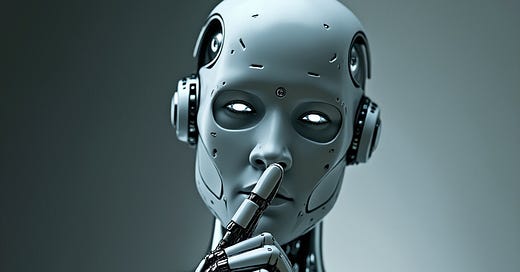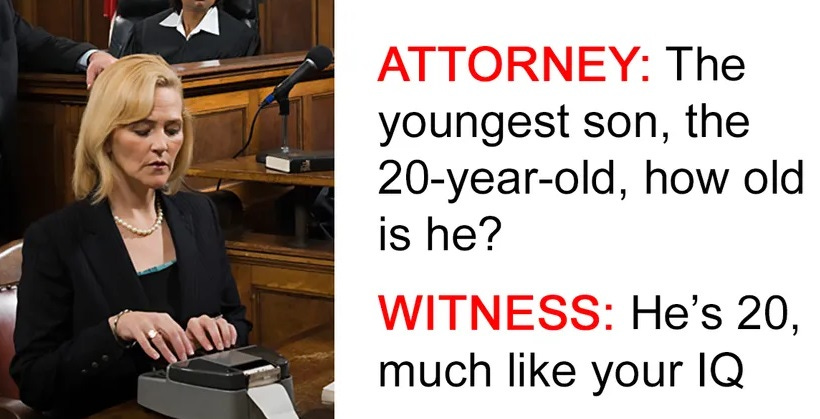Don't talk,
information arbitrage,
rescuing robots,
and the promise of AI.
I always like to say that I am an "organic convert" to AI. What do I mean?
Since I graduated law school in 2002, and even before that working in law as a clerk, I was able to observe patterns in law which repeated.
One such pattern is the information flow between client and lawyer.
Attorney would say, and do, "limit intake," and "don't waste all your time"
(because much of it is not billable)
or "we've got a job to do here and can't waste time talking."
It doesn't "make money" (even though it may in the long run, but its a "risk" of "wild goose chases.")
Rightly on a certain level, we are there to obtain specific information and mostly yes/no answers to questions. Only that and nothing more.
This is because we were taking a "fact pattern" through a "decision tree" (my later word for it).
We had (have) a template in mind of what the law "is" or "is not" and were looking for corfirms and contrasts so we could measure the facts against the law and hang all the facts on the tree.
Some facts "helped" some facts were "irrelevant."
"Outlier facts"
This bothered (and still does) me because a client has a story to tell.
Yes, some of it is extraneous to the core calculations.
All of it is important.
Yet, you don't know beforehand.
And so it always felt to me like "the baby was being thrown out with the bath water."
And sometimes I saw this.
Oddly enough, most clients do not like to be told to stop talking.
Oddly enough, most lawyers actually want LESS information instead of more.
It makes it "easier."
Yet, every time when I had the chance to spend more time speaking with clients, I would often find that key facts were embedded only in longer expositions. These would not have otherwise been found except for the “wasted time.”
Diamonds in fields you had to walk through.
These were never reached in the cursory or limited scope interview.
People as it turns out speak non-linearly and forget and remember things and are triggered by other thoughts.
Communicating works like an "engine", warming up the mind and bringing to the table even facts they had priorly forgotten. We are not instant-recall robots.
Think of going to coffee with a friend.
Many lawyers know this and part of it is also psychology.
In an office setting or in a "lawyer interview" people are nervous and you get less information sometimes than you should.
"Let's take a break," having lunch or doing something "non-work" often makes the real information flow.
[True statement — you can learn 1000% more standing outside with client during a 5 minutes break in a desposition than you may have learned for weeks before that.]
Sex matters. If I could I would shoot hoops with every guy client, and have coffee with every gal client. Men and women are different.
So, learning that:
a) the traditional modality of law limits information from client
b) that "flow of information" nevertheless is where you can find "gems" of data you had not expected and you can't expect it
c) client expostion does not pay, but is necessary for best results And seeing AI I went "light bulb."
"You mean we can capture it all (or much much more)?!"
"You mean it could be a mechanism for client expression?"
"You mean the robots can help us to see more, learn more, and be able to quickly technically sift?"
And so for me this answered a "puzzle" a "nag" an "question" a need of the law practice.
This is what "organically converted" me to AI despite not having a technical background. I recognized it as a "great enabler" for this long ignored need.
We don't have to binarily go "green light, red light" with client; "talk" and "don't talk." "I've got what I need, thanks."
We can now INVITE ALL INFORMATION FROM CLIENT.
The robots can help both lawyer and client.
Large data set parsing, instant documents “look-through”, creation of bespoke tools which lawyer can use and which client can be instructed to use to refresh their thinking and/or train their minds on law or facts! Thus trained or refreshed they are capable of giving even more diamonds.
AI makes possible for the first time this "hack" in the way law is practiced in this one discrete aspect (alone).
AI makes possible greater and better client "data".
PS - And sometimes lawyer and client get to speaking from two different “hymnals”…





